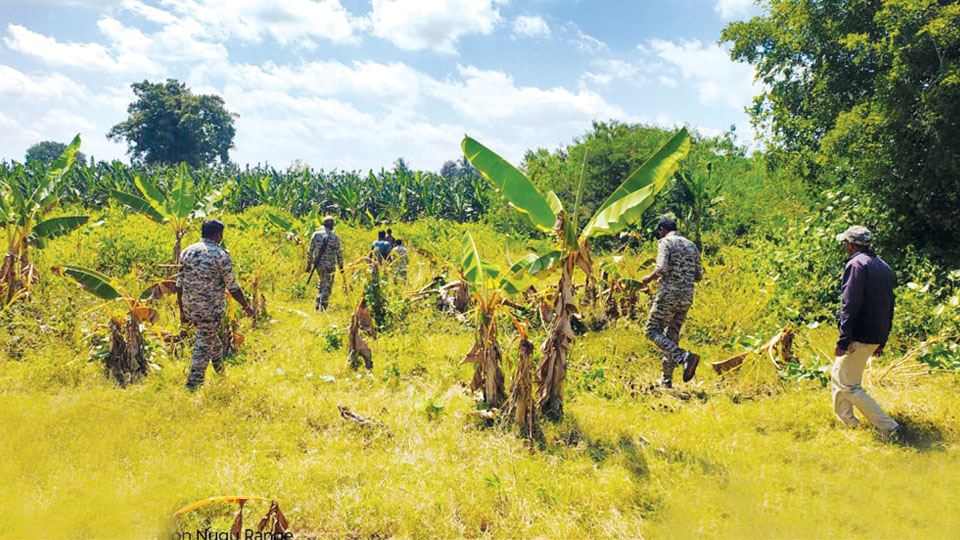Copyright starofmysore

Chamarajanagar: Days after reducing the number of safaris at Bandipur and Nagarahole Tiger Reserves, citing rising man-animal conflict, Forest Minister Eshwar Khandre on Sunday warned that safaris would be suspended entirely if the situation is not brought under control. Speaking at a coordination meeting of Forest, Revenue and Police officials at the Chamarajanagar Zilla Panchayat auditorium, the Minister asserted that staff shortage cannot be an excuse for the increasing incidents of conflict in districts adjoining forest areas. “If there aren’t enough personnel to manage conflict-prone areas, then staff deployed for safari duties must be reassigned,” Khandre said. Meeting after two deaths The Minister’s remarks came after two farmers were killed in tiger attacks on the fringes of Bandipur Tiger Reserve. He directed officials of all concerned departments — Forest, Police and Revenue — to work in close coordination to contain such incidents, particularly along the borders of Bandipur National Park. As a precautionary step, Khandre said forest personnel posted on safari duty would be redeployed to high-risk areas. On Oct. 31, farmer Doddaningaiah (65), a resident of Koodagi village, who was grazing his cattle at a field in the forest border, was killed by a tiger near Saragur. 48-year-old Mahadevegowda of Badagalapura was seriously injured in a tiger attack on Oct. 16 and is undergoing treatment at a private hospital in Mysuru. Another farmer, Rajashekar of Bennegere village, was killed by a tiger on Oct. 26 near Mulluru. Farmer leaders had demanded a complete suspension of safaris, arguing that beaming headlights from safari vehicles frighten wild animals, particularly leopards and tigers, driving them into nearby villages. Highlighting the increase in both elephant and tiger populations, Khandre said expanding forest areas was not feasible and stressed the need to ensure adequate food sources within existing habitats to prevent wildlife from straying into human settlements. Treating with sensitivity Referring to the recent tiger-mauling incident at Saragur, the Minister criticised the decision to send the victim’s body to Mysuru for post-mortem instead of conducting it locally. He urged officials to handle such cases with sensitivity and efficiency, ensuring that families receive the bodies promptly. “No one should lose their life due to human-wildlife conflict. If such a tragedy occurs, the District Administration, Police, Forest and Health Departments must act responsibly and remain present until the funeral to maintain order,” he said. He instructed officials to build trust among villagers, strengthen communication and ensure that patrolling vehicles operate round the clock to respond swiftly and drive back straying wild animals into the forests. Mysuru District Minister Dr. H.C. Mahadevappa, MLAs C. Puttarangashetty, A.R. Krishnamurthy, H.M. Ganesh Prasad, Anil Chikkamadu, Darshan Dhruvanarayan and M.R. Manjunath, MLCs C.N. Manjegowda and Shivakumar, Chamarajanagar DC Shilpa Nag, Mysuru DC G. Lakshmikanth Reddy, Principal Chief Conservator of Forests (PCCF) (Head of Forest Force) Meenakshi Negi, Chief Wildlife Warden of Karnataka P.C. Ray and senior officials from the Forest Department were present at the meeting. People have started venturing deep into forest areas and as a result, wild animals are coming out. There’s a shortage of fodder and water inside the forest, which is also driving animals toward human settlements. Illegal resorts are increasing along forest borders. We will take action to curb them. We’ve also noticed a rise in safari operations and steps will be taken to reduce their number. I will convene a separate meeting regarding the recent tiger attack incidents. —CM Siddaramaiah, Speaking to reporters at Mysore Airport this morning CONFLICT MANAGEMENT ACTION PLAN An action plan was also announced at the meeting to tackle the growing number of conflicts. The measures include: • Identifying conflict-prone zones and documenting recurring issues. • Deploying staff strategically based on the severity of conflict, including drawing personnel from nearby forest ranges if required. • Increasing patrolling, equipping vehicles with GPS and maintaining patrol registers in border villages. • Ensuring regular visits by officials to affected villages. • Involving local communities by designating youth and elders as “Aranya Mithras” to assist in patrolling and wildlife rescue operations. • Ensuring 24×7 availability of vehicles and staff in villages near wildlife corridors. • Conducting awareness programmes and mock drills for villagers, youth and children on how to respond during wildlife encounters. • Establishing coordination committees at the district and taluk levels for inter-departmental cooperation and periodic review meetings.



